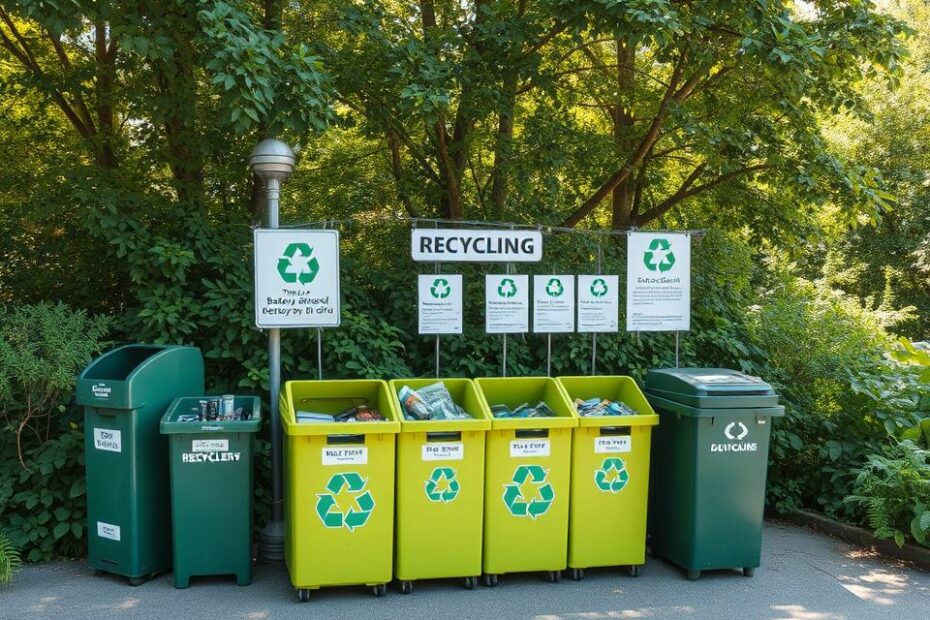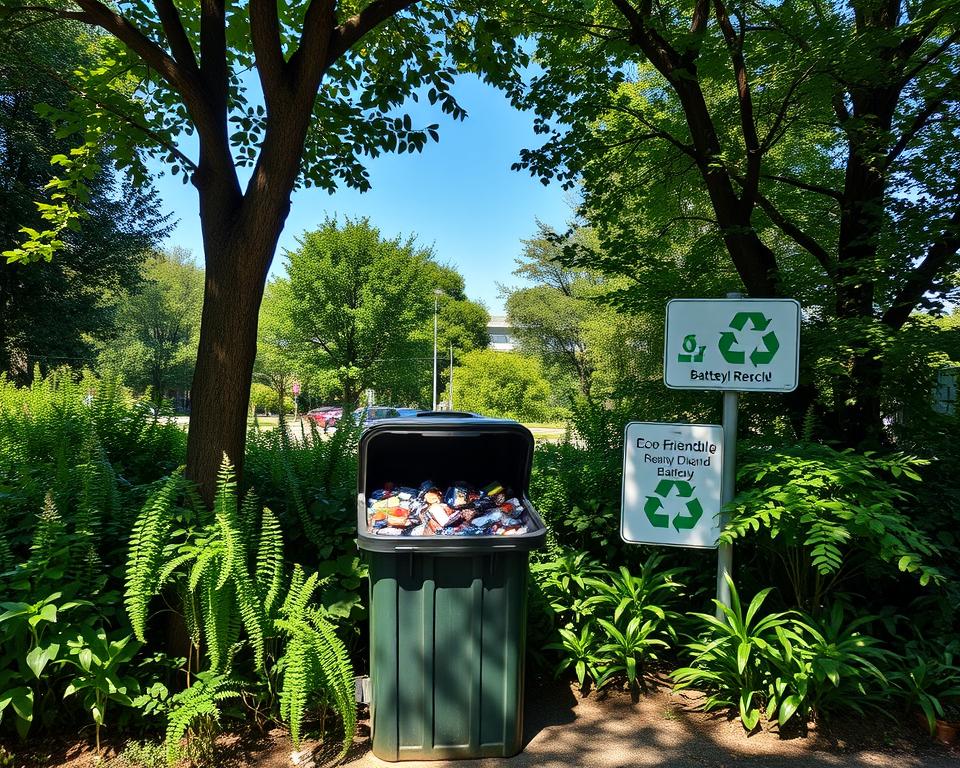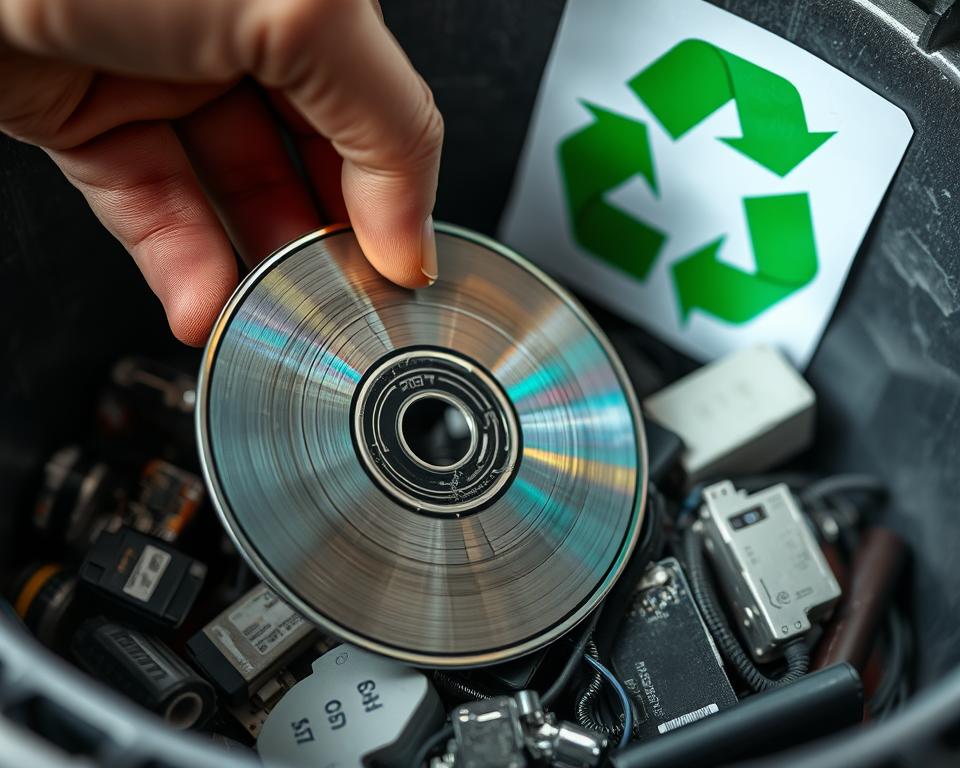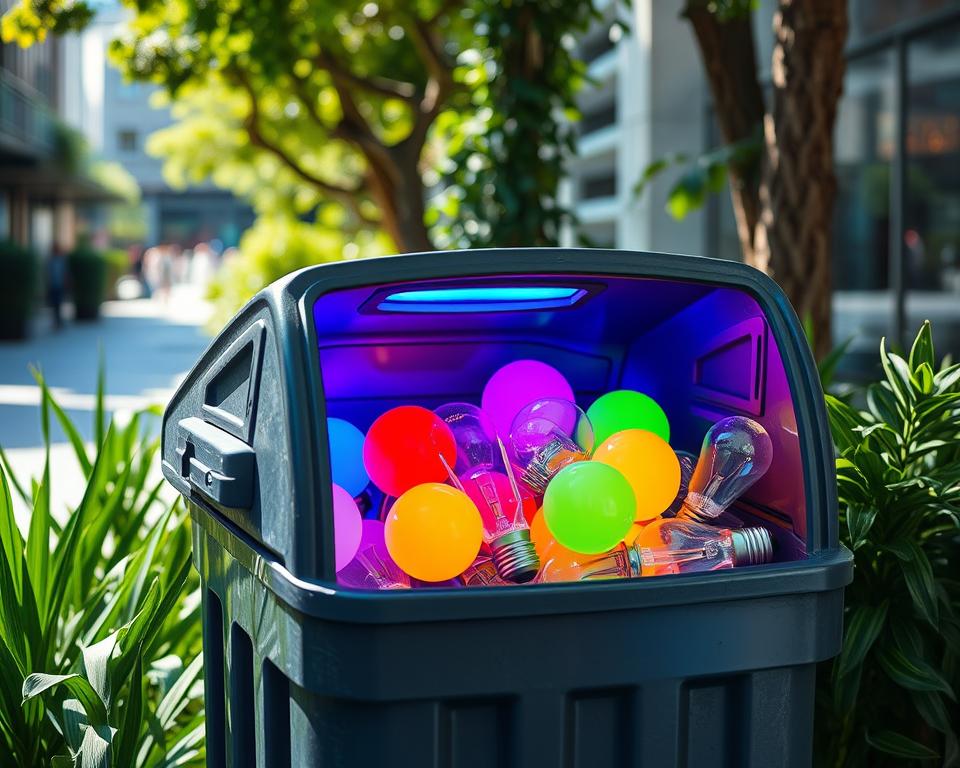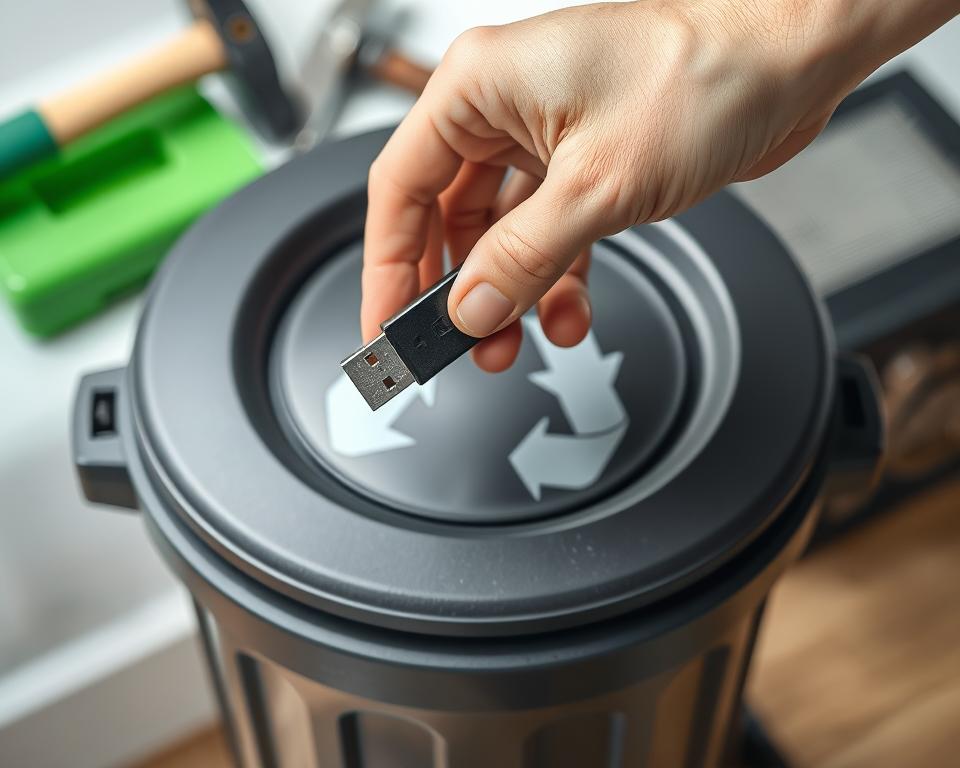Did you know over 3 billion batteries are made every year? But, throwing them away the wrong way harms our planet. This guide will teach you how to handle batteries right, from alkaline to lithium-ion. You’ll learn how to choose eco-friendly options and reduce your impact.
Batteries are everywhere, powering our gadgets and cars. But, if we get rid of them wrong, they can pollute our earth. This article will show you how to dispose of batteries safely and responsibly.
The Importance of Proper Battery Disposal
Batteries are key in our daily lives, powering everything from phones to cars. But, throwing them away wrong can harm the environment. They contain harmful stuff like lead, mercury, and lithium that can pollute soil, water, and air.
Environmental Impact
When we toss batteries in the trash, these harmful materials can leak into the environment. This leads to pollution and harms local ecosystems. It threatens wildlife and can even contaminate our water. So, it’s vital to dispose of batteries properly to protect our planet.
Hazardous Materials
The battery hazardous waste in batteries is dangerous for both humans and the environment. It can cause health problems like brain damage, breathing issues, and even cancer. It’s crucial to dispose of batteries safely to keep our communities and the planet safe.
Knowing how important proper battery disposal is, we can all help. We can reduce the harm caused by these essential power sources. This way, we protect our shared resources for future generations.
Types of Batteries and Their Disposal Methods
It’s important to dispose of batteries the right way to protect our environment and health. Each type of battery, like alkaline, rechargeable, lithium-ion, and lead-acid, needs its own way to be thrown away. This ensures they are handled safely and don’t harm the planet.
Alkaline batteries, found in many homes, can usually go in the trash. But, more places are starting recycling programs for them. This helps keep them out of landfills.
Rechargeable batteries, used in gadgets and tools, have heavy metals. They need to be recycled to get these valuable materials back. You can find recycling spots at stores and local government offices.
Lithium-ion batteries, in phones, laptops, and electric cars, can catch fire if not disposed of right. They need special ways to be thrown away to avoid safety risks.
Lead-acid batteries, found in cars, can be recycled well. Many car parts stores and places for hazardous waste take them. This way, the lead is reused and not wasted.
| Battery Type | Disposal Method |
|---|---|
| Alkaline | Curbside trash or local recycling program |
| Rechargeable | Drop-off at retailer or local government facility |
| Lithium-ion | Specialized disposal or recycling service |
| Lead-acid | Auto parts store or hazardous waste facility |
Knowing how to handle each battery type helps us all be more eco-friendly. It’s a step towards a greener future.
Alkaline Battery Disposal
Alkaline batteries are common in homes. It’s important to dispose of them properly to protect the environment. There are many ways to recycle and dispose of them responsibly, including collection programs in the United States.
Collection Programs
Many battery collection programs now make recycling easier. You can take your used batteries to places like local offices, stores, or recycling centers. This way, you help the environment by recycling your alkaline battery recycling correctly.
To find a battery collection program near you, contact your local government or waste management. Many retailers also offer recycling services. They accept different types of batteries, including alkaline, lithium-ion, and lead-acid. This makes it easy to dispose of all your batteries in one place.
| Type of Battery | Recommended Disposal Method |
|---|---|
| Alkaline | Recycling through battery collection programs |
| Lithium-ion | Specialized recycling facilities |
| Lead-acid | Automotive shops or hazardous waste centers |
Rechargeable Battery Recycling
Rechargeable batteries, like those in gadgets and tools, can be recycled. This is key to lessening the harm to our planet. It also helps us manage batteries better.
Recycling these batteries saves natural resources and cuts down on harmful waste. They contain valuable materials like cobalt and lithium. These can be used again in making new products.
Benefits of Rechargeable Battery Recycling
- It lowers the need for mining, which is better for the environment.
- It stops harmful substances like heavy metals from getting into our air and water.
- It saves space in landfills and keeps waste out of them.
- It helps get valuable materials for making new batteries or other items.
Rechargeable Battery Recycling Programs
Many places, stores, and recycling services have programs for recycling rechargeable batteries. They take batteries from laptops, phones, and tools.
To find a recycling program near you, check with your local waste management or visit Call2Recycle. They can tell you where to take your batteries and how to do it right.
| Battery Type | Recycling Process | Recovered Materials |
|---|---|---|
| Lithium-ion | Mechanical, thermal, and hydrometallurgical processes | Cobalt, lithium, nickel, copper |
| Nickel-cadmium | Pyrometallurgical and hydrometallurgical processes | Cadmium, nickel, iron |
| Nickel-metal hydride | Pyrometallurgical and hydrometallurgical processes | Nickel, rare earth elements |
Recycling rechargeable batteries helps our planet and saves resources. Always handle and transport batteries safely to protect the environment.
Lithium-Ion Battery Disposal
Lithium-ion batteries power many devices, like smartphones and electric cars. They are efficient but need careful disposal because they can catch fire and contain harmful materials.
Safety Considerations
Lithium-ion batteries can start fires if damaged or not disposed of right. To safely get rid of them, follow these steps:
- Don’t throw lithium-ion batteries in regular trash or recycling bins.
- Never try to open or puncture the batteries, as it can make them catch fire.
- Keep lithium-ion batteries in their original packaging or a sealed plastic bag to avoid short circuits.
- Look for battery hazardous waste collection programs or recycling services to dispose of them correctly.
It’s vital to dispose of lithium-ion batteries safely to avoid fires and protect the environment from their harmful chemicals.
| Disposal Method | Considerations |
|---|---|
| Curbside Recycling | Not recommended for lithium-ion batteries due to fire risk. |
| Specialized Recycling | Ensures proper handling and recycling of hazardous materials. |
| Hazardous Waste Collection | Safely disposes of batteries and prevents environmental contamination. |
Lead-Acid Battery Disposal
Lead-acid batteries are found in many vehicles. They contain lead and sulfuric acid, which can harm the environment if not disposed of right. It’s important to recycle these batteries to protect our planet.
Recycling Options
Recycling is the best way to get rid of lead-acid batteries. These batteries can be recycled up to 99% of the time. Here are some ways to recycle them:
- Automotive Retailers: Many auto parts stores and service centers recycle used batteries. They might even give you a small fee or credit.
- Hazardous Waste Facilities: Check your local hazardous waste center or landfill. They might accept lead-acid batteries for recycling.
- Battery Recycling Services: Specialized companies can pick up and recycle large amounts of batteries. They make sure everything is handled safely.
| Recycling Option | Convenience | Environmental Impact |
|---|---|---|
| Automotive Retailers | High | Moderate |
| Hazardous Waste Facilities | Moderate | High |
| Battery Recycling Services | Low | High |
Choosing the right recycling option helps keep our environment safe. It ensures lead-acid batteries are handled and recycled properly. This helps reduce harm to our planet and supports the recycling of battery materials.
Battery Hazardous Waste Regulations
Batteries are hazardous waste because they contain toxic substances. They must be disposed of according to federal and state laws. This is to protect the environment and human health.
In the United States, the Resource Conservation and Recovery Act (RCRA) manages hazardous waste, including batteries. RCRA sets strict rules for handling and disposing of hazardous materials.
RCRA classifies batteries as battery hazardous waste if they have certain levels of lead, mercury, cadmium, or other hazardous materials. These batteries must be disposed of properly to avoid harming the environment or public health.
Many states also have their own battery disposal regulations that are stricter than federal laws. These laws give detailed instructions on proper battery disposal methods. They include setting up battery collection and recycling programs.
| Federal Regulations | State Regulations |
|---|---|
|
|
Following these regulations is key to protecting the environment and public health. Recycling or proper hazardous waste collection can reduce risks from battery waste. It helps ensure a sustainable future.
battery disposal
Proper battery disposal is key to protecting our environment. Each battery type, like alkaline, rechargeable, or lithium-ion, needs special care. This care helps avoid contamination and ensures waste is managed right.
Batteries hold harmful materials like lead, cadmium, and mercury. If not thrown away right, these can pollute soil and water. Bad battery disposal can also harm wildlife and ecosystems.
To lessen these dangers, we must learn about proper battery disposal methods. Many places have programs for collecting and recycling batteries. Using these resources helps protect our planet.
Knowing the environmental impact of improper battery disposal encourages us to act. By teaching others and pushing for better disposal, we can make a difference. This leads to a cleaner, healthier world for all.
In conclusion, battery disposal is a must for our planet and our duty. By choosing wisely and using the right disposal methods, we help our environment. This way, we ensure a greener future for everyone.
Local Battery Collection and Recycling Services
More and more communities in the United States are starting battery collection programs and recycling services. These efforts help people get rid of used batteries the right way. They make sure harmful materials don’t end up in landfills.
Finding Resources
Finding places to recycle batteries is easy with online tools and directories. Just search for “battery collection programs” or “battery recycling services” in your area. Websites of cities, waste management, and green groups list local battery disposal options.
Big stores like Best Buy and Batteries Plus Bulbs take many types of batteries for recycling. Some car makers and battery companies also have mail-back programs. This makes recycling batteries easy for everyone.
| Battery Collection Programs | Battery Recycling Services | Local Battery Disposal Options |
|---|---|---|
|
|
|
Using these resources, people can find and use battery recycling services in their area. This ensures used batteries are disposed of safely and eco-friendly.
Proper Storage and Transportation of Batteries
It’s important to store and transport batteries safely. This keeps them from harming the environment. When dealing with battery hazardous waste, being careful is key.
To properly handle batteries, follow these steps:
- Store batteries in a cool, dry place, away from heat sources and direct sunlight.
- Keep batteries separated by type to avoid short circuits and potential fires.
- Use original packaging or secure containers when transporting batteries.
- Avoid mixing different battery types in the same container or bag.
- Label containers with the battery type and date of storage or transportation.
- Wear protective gear, such as gloves and eye protection, when handling leaking or damaged batteries.
- Dispose of batteries properly through authorized collection or recycling programs.
By following these battery disposal safety and proper battery handling tips, you can lower the risk of accidents. This also helps protect the environment during storage and transport.
| Battery Type | Storage Considerations | Transportation Guidelines |
|---|---|---|
| Alkaline | Keep in a cool, dry place. Avoid direct sunlight. | Use original packaging or secure containers. Separate from other battery types. |
| Rechargeable (Li-ion, NiCd, NiMH) | Store in a cool, dry place. Avoid high temperatures. | Use original packaging or secure containers. Separate from other battery types. |
| Lead-Acid | Store upright in a well-ventilated area. Avoid freezing temperatures. | Use original packaging or secure containers. Separate from other battery types. |
By following these guidelines, you can ensure the battery disposal safety and proper battery handling during storage and transport. This reduces the risk of battery hazardous waste incidents.
DIY Battery Disposal Methods
Proper battery disposal often means recycling or taking batteries to special facilities. But sometimes, you might need to do it yourself. Using DIY battery disposal methods can be helpful. However, it’s very important to keep battery disposal safety in mind.
Safe Handling Tips
When you’re disposing of batteries by yourself, follow these safety tips:
- Protect your hands by wearing gloves to avoid touching the battery contents.
- Make sure the battery terminals are covered or insulated to prevent short circuits.
- Carry the batteries in a strong, non-conductive container to avoid leaks or damage.
- Don’t store or carry batteries with other metal things, as it can cause short circuits.
- Never throw batteries in a fire or try to take them apart, as it can release harmful materials.
By sticking to these proper battery disposal methods, you can safely get rid of your batteries at home. This helps the environment and keeps you safe.
Conclusion
Proper battery disposal is key to protecting our environment. We’ve looked at how to dispose of different types of batteries safely. This includes alkaline, lithium-ion, and lead-acid batteries.
By choosing eco-friendly disposal methods, we can all help. This means using local recycling programs or recycling rechargeable batteries. It also means following safety rules for lithium-ion batteries.
There are many resources out there to help with battery disposal. Understanding these options and choosing responsible disposal can protect our planet. Let’s work together to make a greener future, one battery at a time.
FAQ
What types of batteries can be recycled?
You can recycle many types of batteries at home. This includes alkaline, rechargeable, lithium-ion, and lead-acid batteries. Look for local programs or services to recycle them.
Why is proper battery disposal important?
Batteries have harmful materials like lead, mercury, and lithium. If not thrown away right, they can pollute our environment. This pollution can harm our soil, water, and air, and even ecosystems.
How do I dispose of alkaline batteries?
Alkaline batteries can be recycled through local programs or at electronic waste recycling centers. Many places and stores offer recycling services for these batteries.
Where can I recycle rechargeable batteries?
Rechargeable batteries, like those in electronics and tools, can be recycled in several ways. Look for programs from battery makers, retailers, and local waste services.
How should I dispose of lithium-ion batteries?
Lithium-ion batteries are flammable and need special care. Take them to recycling facilities or hazardous waste centers. Don’t throw them away in regular trash.
What are the regulations for disposing of lead-acid batteries?
Lead-acid batteries, found in cars, are hazardous waste. They must be recycled by authorized centers or returned to the store or maker.
How can I find local battery collection and recycling services?
Many places offer battery recycling programs. Check with your local government or use online tools to find recycling centers near you.
What are the safety considerations when handling batteries?
Always be careful when handling batteries. Keep them apart, avoid touching metal, and follow local advice and recycling guidelines.
